
Some people are born entrepreneurs. From the time they were kids, running a weekend lemonade stand, to the day they open the doors of their business as adults, they couldn’t imagine doing anything other than working for themselves to bring their brainchild to market. These passionate innovators are willing to work tirelessly to see their business venture succeed, and are willing to risk the odds of failure in order to do so.
But if you’re one of these born entrepreneurs, you know that it takes more than passion and work ethic to beat the odds and create a thriving company. You’ll need rock-solid business skills and a network of investors, mentors, and advisors. An MBA in Entrepreneurship can prepare you for a future running your own business.
Featured Schools
What is an MBA in Entrepreneurship?
An MBA in Entrepreneurship is a traditional Master of Business Administration (MBA) program with a concentration in Entrepreneurship. To earn this degree, you’ll take a full MBA core courseload, of which your non-core courses will cluster around topics related to entrepreneurship, such as venture capital and small business management.
This multidisciplinary area of concentration is designed to prepare graduates to start their own business, knowing everything from how to write a real-world business plan, to how to manage a business at the international level. Students learn through traditional classes, through case studies and project-based assignments, and will even create a much business or business plan in their capstone class.
Why Pursue Entrepreneurship?
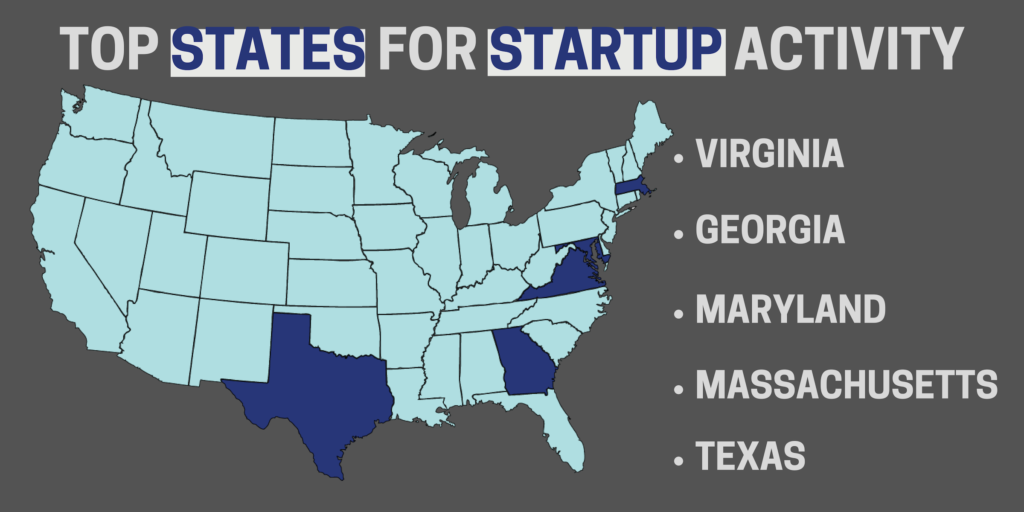
With all the risks associated with starting a business, why be an entrepreneur? Actually, in many respects, it makes more sense than ever. Gone are the days when employees worked for the same company thought their careers, and retired with a cushy pension. Today’s professionals have to be more and more self-reliant for benefits like health insurance and retirement savings, and develop a flexible career path that spans several organizations and roles. Many people are already freelancing and participating in the growing gig economy, at least on a part-time basis. Given this instability, striking out on your own may not seem like too much of a leap.
In fact, we are already fairly comfortable with the idea of working for ourselves. According to MBO Partners, self-employment grew by almost 3% from 2016-2017, hitting a total of 40.8 million Americans. Infrastructure to support small businesses is now everywhere- think shared on-demand workspaces, and productivity tools like Trello and Slack. Startups can also take advantage of the thriving gig economy by hiring contract workers to execute projects, making it easier to get off the ground.
The overall growth in the economy, business tax code adjustment, and new job creation, all add up to make this a good time to start a business. Venture capital is easier to come by, too- investors put more money into startups in 2018 than ever before. And some of those startups are hitting the big time; 2018 also saw the emergence of over 40 “unicorn” businesses- privately held startup companies that are valued at over $1 billion. And you’ll find fertile ground for startups across the nation, not just the states with the biggest economies. The Kauffman Index shows that the top states for startup activity are diverse in terms of size and region.
Tech has been a game-changer as well. Decades ago, business technology meant investing massive funds in computing resources or custom solutions for your business. Today, everyone from mom-and-pop shops to new corporations can take advantage of software applications to glean market insights, predict consumer behavior, automate business tasks, track employees’ time, and more. Subscription-based services and cloud-based computing mean you won’t be tied to large hardware purchases to access these game-changing tools either. More good news for entrepreneurs? The tech field is still a red-hot field for staring a new business. In fact, AI (artificial intelligence) ventures like robotics and predictive modeling are predicted to become a $13 trillion market opportunity by 2025!
Start a successful business, and you’ll be able to work for yourself, setting your own schedule and making your own business decisions. Best of all, you’ll have meaningful work based on your personal vision, and the satisfaction of starting something entirely new.. If your company thrives, you’ll have a lasting legacy, and a lucrative source of income. You may even be able and willing to step back and allow others to oversee it while you move on to pursue other ventures.
Why Earn an MBA?
A Master’s in Business Administration (MBA) has long been held as the most reliably lucrative master’s degree. It’s also the most popular, with 189,328 students earning an MBA in the 2014-2015 academic year alone, according to the National Center for Education Statistics. That means 1 in 4 master’s degrees awarded were MBAs. MBAs are also a great value, according to those who hold them. According to the Graduate Management Admission Council (GMAC) Alumni Perspectives Survey 95% of MBA graduates called their degree a “good, excellent or outstanding value.”
Why Earn an MBA in Entrepreneurship?
Putting together what we’ve covered about MBAs and about Entrepreneurship, we can address the question, “why get an MBA in Entrepreneurship?”
If you’re a born entrepreneur, you’ll want more than anything to make your brainchild a success. You have a dream of starting something new and the willingness to work hard to make it happen. But to achieve success, you’ll have to have the business skills to make bring your vision to market and stay competitive.. That’s where an MBA in Entrepreneurship comes in.
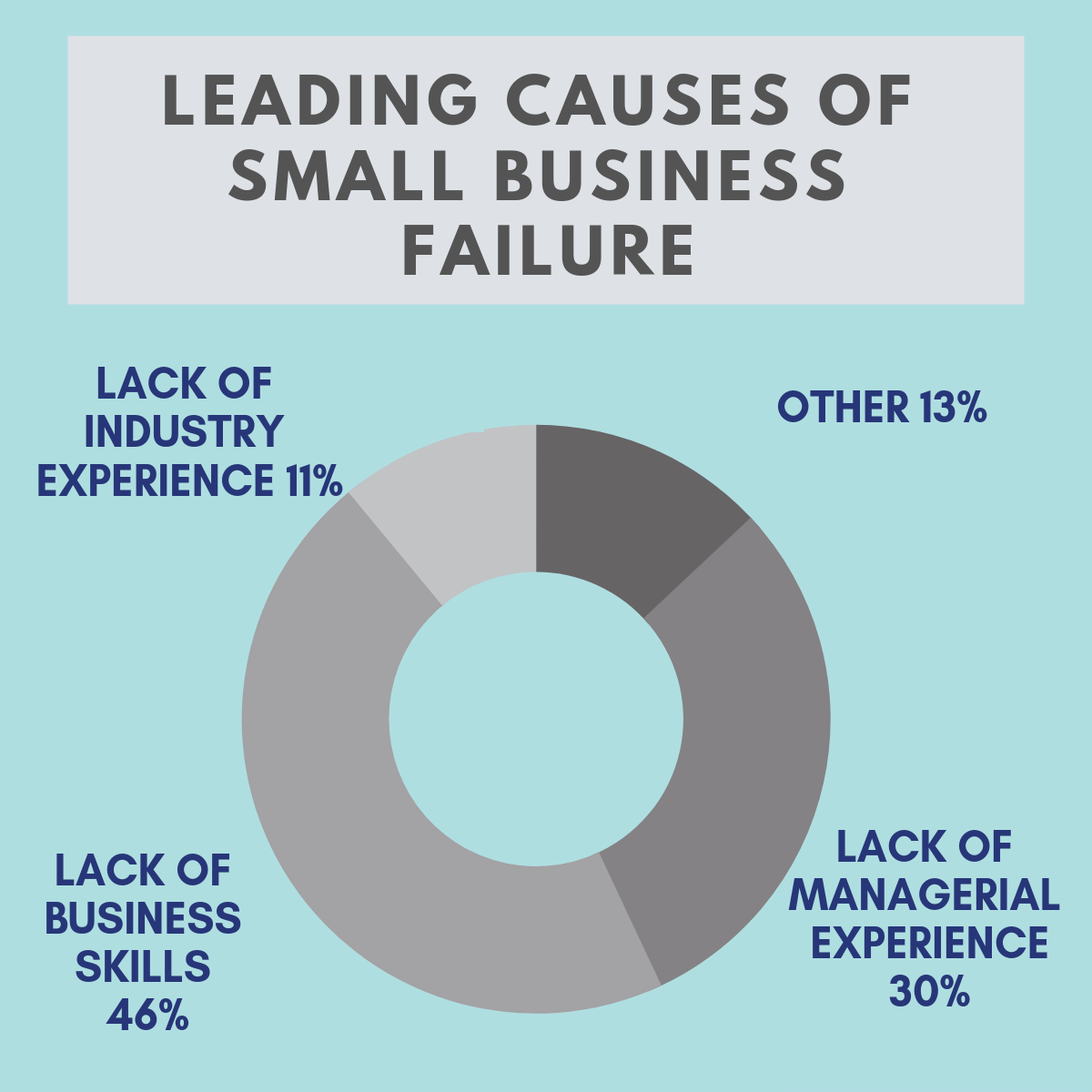
To get an idea of what you’ll need to succeed, let’s look at the opposite- why startups fail. According to statistics compiled by Small Biz Trends, the leading causes of failure for new business are:
- Lack of Business Competence: 46 percent
- Lack of Managerial Experience: 30 percent
- Lack of Industry Experience: 11 percent
- Other: 13 percent
It’s clear that not having the necessary skills for starting and running a business is a death sentence for new businesses. From accounting and commercial leasing to leadership and management, you’ll need to know how to handle your business from concept to exit. An MBA in entrepreneurship provides exactly this solid business skill training through targeted coursework.

In an MBA in entrepreneurship program, you’ll also be learning from professionals who have real-world experience as entrepreneurs. These seasoned pros have real-world insights, and can serve as mentors and advisors to you as you develop your business plans. The guidance of an experienced entrepreneur can save you from costly errors and help you make decisions as you learn the ropes. You’ll also develop a powerful network of business-minded peers, and make contact with guest lecturers, professors, and other business professionals who can help you connect with future investors, business partners, and board members.
Finally, business schools often have special resources for entrepreneurs, such as labs for prototyping, industry partnerships, and startup incubators. If you’re pursuing an MBA in entrepreneurship, you should absolutely seek out a school that supports student innovators in this way. Many people actually start their businesses while still in business school in order to take advantage of these special supports, and to have a “safe space to fail” where they can minimize risk and quickly learn from their mistakes.
What Will I Learn in an MBA in Entrepreneurship Program?
Every business school has its own MBA program, and all are different in their format, length, specialization, and emphasis. Some schools emphasize hands-on learning, other tout their global perspective. Elite schools offer a prestigious reputation, while second-tier schools can deliver a faster return on investment. Whatever business school suits your preferences, your MBA program will likely follow the same basic format.
Entrepreneurship MBA programs typically require around 36 credits, and culminate in a capstone project, such as creating a mock business venture. Of these 36 course credits, the Entrepreneurship concentration typically makes up about 9, with the rest making up the MBA core. You’ll start with foundational courses like Accounting, Micro- and Macroeconomics, Marketing, and Operations. Once you have a strong grasp on business fundamentals, you’ll be able to apply these to your Entrepreneurship concentration.
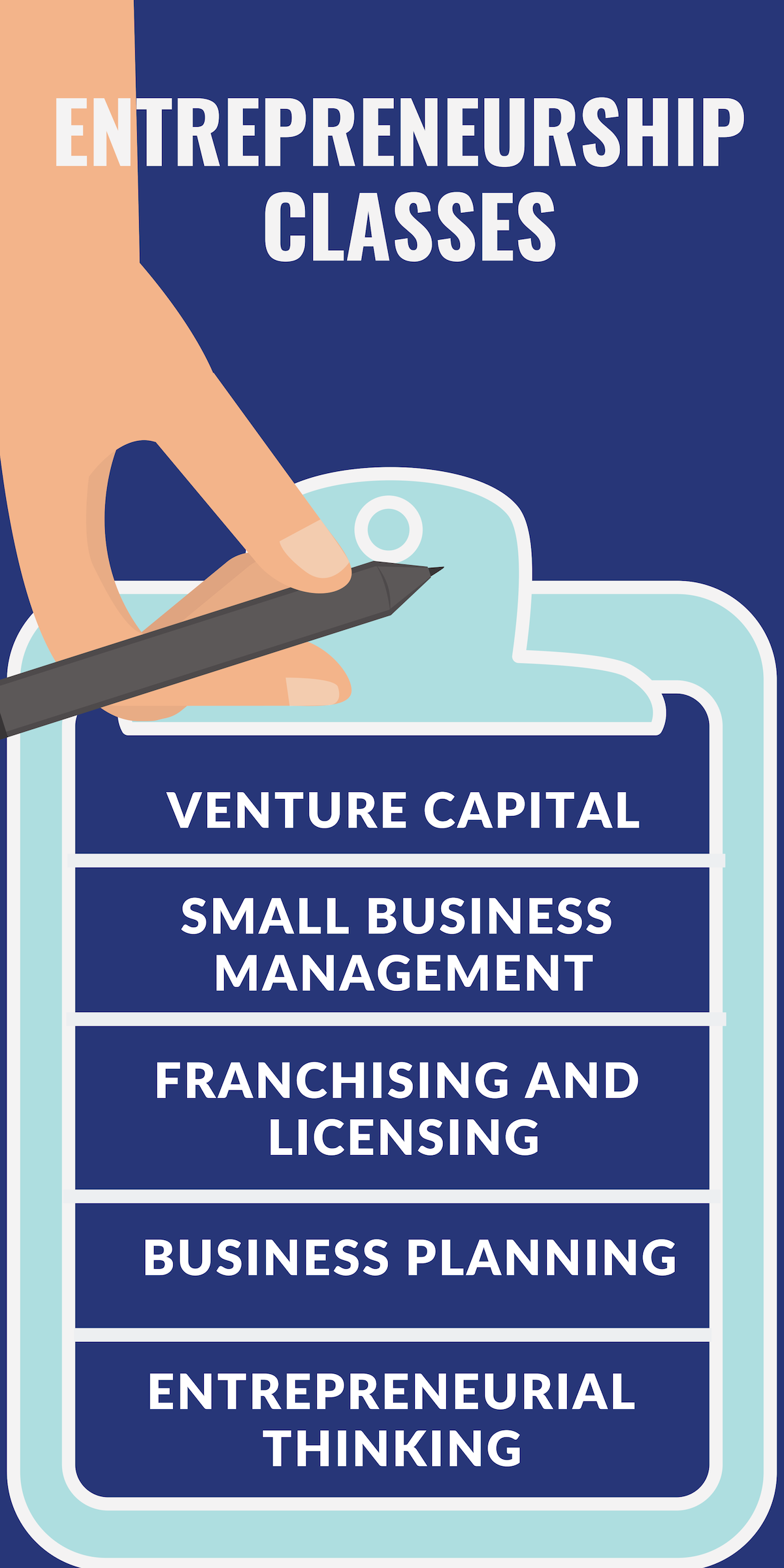
Your entrepreneurship classes may include titles like:
- Business Innovation
- Financing New Ventures
- Entrepreneurial Thinking
- Small Business Management
- Entrepreneurial Planning and Feasibility
- Identifying Opportunity
- Franchising and Licensing
- Commercial Leasing
- Business Ethics
- Value Investing
- Intrapreneurship
- Resource Management
- Exit Strategies
You may be able to further specialize through your selection of electives. If your prospective business venture involves innovations healthcare, tech, or sustainability, for instance, your choice of electives in these areas can give you an edge in your niche area of the market.
How Long Does an MBA in Entrepreneurship Take?
An MBA degree traditionally takes two years to earn on a full-time basis, at a pace of about 9 credits (or three courses) per semester. If you’re eager to finish your MBA in entrepreneurship and get your idea to market, though, you may want to look for a faster option. For those who want to speed up their pace of completion, many schools offer accelerated MBAs, which involve a heavier course load and can take as little as 18 months, with the very fastest being a year.
A large number of people choose the opposite route- earning an MBA more slowly by taking classes part-time. This is especially common in the case of an MBA in entrepreneurship; many entrepreneurs start off holding down full-time jobs while also dedicating time to a side-hustle in the form of a micro-business or consulting practice. To grow this side-gig into a full-fledged business, they opt to attend an entrepreneurship MBA part-time, all while holding down their original day job. Other entrepreneurs want to keep working while attending school in order to save up funds for their business venture. Whatever your reasons for taking classes part-time, you can expect your MBA to take 3 years or longer as you take 1-2 classes per semester.
Featured Schools
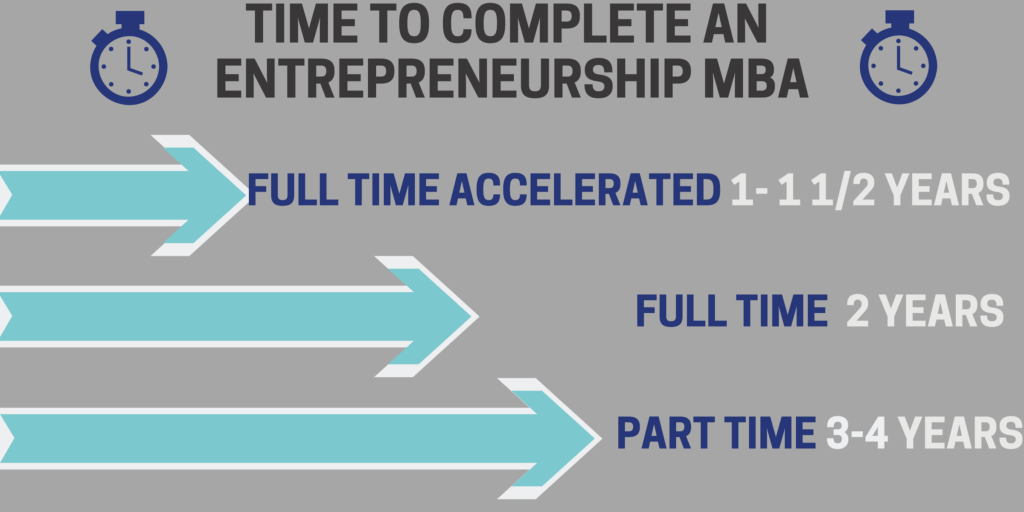
Can I Earn an MBA in Entrepreneurship Online?
Online Entrepreneurship MBAs are one way to make this degree more accessible. If you’d like to hold down your existing job while working towards your startup dreams, you’ll likely find it easier to fit in class work at odd hours than to attend regularly scheduled on-campus classes.
The curriculum of an online entrepreneurship MBA usually follows the same format as an on-campus program, with the same general number of credits, electives, and capstone project. Online entrepreneurship classes typically have a blend of recorded, on-demand lectures, individual and group assignments, message board-based discussions, and video conferencing. This blend of synchronous and asynchronous content is designed to promote connections between student peers. Online MBA programs also usually follow a cohort-based format, in which you’ll progress through the curriculum at the same pace as the rest of your graduating class. As with collaborative class work, this approach promotes student networking, which serves as a valuable resource for entrepreneurs.
How Much Does an MBA in Entrepreneurship Cost?
The cost of an MBA in entrepreneurship varies widely from one school to another. The overall average tuition for an MBA comes to $60,000. Within this figure, there’s quite a range- the most expensive schools can cost almost twice as much, while cheap schools can cost almost half as much. Top private business schools, such as Pennsylvania Wharton, Harvard, Stanford, and Northwestern Kellogg, charge more than $110,000 per year for tuition, while the cost to attend lesser-known public schools can be closer to $35,000.
In addition to tuition, Investopedia observes that you can be looking at as much as $20,000 in costs for books and boarding, and your required laptop or any academic travel will add more. If you’re attending school full time, that also means you’re not working, and will be racking up additional debt in lost income and opportunity costs (the progress you’d otherwise be making in your career).

Many employers, especially big companies like those among the Fortune 100 do offer tuition assistance for their employees earning an MBA, reasoning that the skill growth for the employee will add value to the company’s bottom line. But for those after an MBA that will help them strike out on their own, getting an employer to foot the bill is far less likely. So how do students pay for their tuition? As we observed above, many continue working while earning their degrees on a part-time basis, or aim to earn their degrees at an accelerated pace in order to take as little time away from earning as possible. In fact, a broad analysis of MBA programs conducted bythe Economist found that cheaper and faster MBAs represented the best return on investment.
Some MBA students rely on loans, scholarships, or a combination of the two. The Graduate Management Admission Council (GMAC) reports that 45 percent full-time MBA students in 2017 received financial assistance. If you’re a strong academic candidate, you may qualify for a fellowship as well.
What is the Career Path with an MBA in Entrepreneurship?
Naturally, people who pursue an MBA in Entrepreneurship want to start their own business. Exactly how they accomplish this, though, can take several forms.
Some people have a lifelong entrepreneurial streak, from the day they opened their first lemonade stand. These business-savvy innovators know they want to start their own business right away, and often go straight from their bachelors programs into an entrepreneurship MBA program, or complete a five-year BA-to-MBA program.
Many other entrepreneurs start off working in an industry in a role such as management, engineering, or product development, before identifying an opportunity. They envision a service or product based on their area of industry expertise that will solve a problem or address a share of the market, and want to develop their idea into a feasible business venture. Others run a small business on the side that grows over time, and shows the potential to become a serious business endeavor.
However your initial spark gets started, an MBA in entrepreneurship can provide you with solid resources to launch your career as a business owner:
- Skills to write a solid business plan
- Credibility to raise venture capital
- A network to source funds and advise
- Mentors to provide guidance
- Knowledge to sustain and manage your business
No matter how much you learn in your entrepreneurship MBA program, there’s a real possibility your business will eventually fold. What then? If your business fails, your MBA will serve as a marketable credential, and help you find employment in the business world.. Not only are MBAs, in general, a desirable degree, but an MBA in entrepreneurship is specifically attractive to businesses. Companies are constantly starting new endeavors, and value the flair for innovation and eye for opportunity that someone with an MBA in entrepreneurship can offer.
If “entrepreneur” isn’t in the cards for you, you’ll be eligible for other great positions with a corporation. Monster.com states that some of the most popular job titles and salaries associated with an MBA in entrepreneurship are:
- Senior product manager: $135,000 average salary
- Product manager, software: $110,000 average salary
- Management consultant: $126,000 average salary
What if you’ve successfully established a thriving company? You could stay on as CEO, as many founders do. You’d be able to oversee the company according to your original vision, and take home a hefty salary. Small Biz Trends, that’s exactly what happens to just over 50% of new businesses in their first four years.
So by making a go as an entrepreneur, you could wind up as the next Jeff Bezos, with a net worth of 133 billion… or you could wind up back where you started. But is that such a bad place? If you hold an MBA in entrepreneurship, you’ll have outstanding career prospects even if your business venture folds. That’s because an MBA in Entrepreneurship is valued by corporate employers, and is associated with great job titles and salaries.
monster.com and the Atlantic both agree that an MBA in entrepreneurship is among the most lucrative MBA concentrations available. Monster reports that with an MBA in entrepreneurship, you’d earn an average salary of $106,000 per year if you worked for a corporation. Job titles include positions like Business Development Director, Marketing Director, and Senior Product Manager. Who’s hiring? Payscale reports that top corporate employers for those with an MBA in entrepreneurship include:
- Amazon
- IBM
- PricewaterhouseCoopers
- General Electric
The latest survey by the EMBA council revealed that the average salary and bonus package for EMBA students was $172,498. By the end of their program, their salary and bonus package had risen to an average of $197,719. That’s a 14.6% increase in total compensation- a huge leap to make in just 2 years! This sizable increase in compensation means that, as an EMBA graduate, you’ll soon see a return on your investment. The Huffington Post explains that it now takes an average of 17 months for an MBA in Entrepreneurship to pay for itself.
Many employers not pay for tuition and pass out promotions to their MBA in Entrepreneurship employees, but also give bonuses for completing this degree. All these facts back up the widespread perception of the EMBA as a sound career investment.
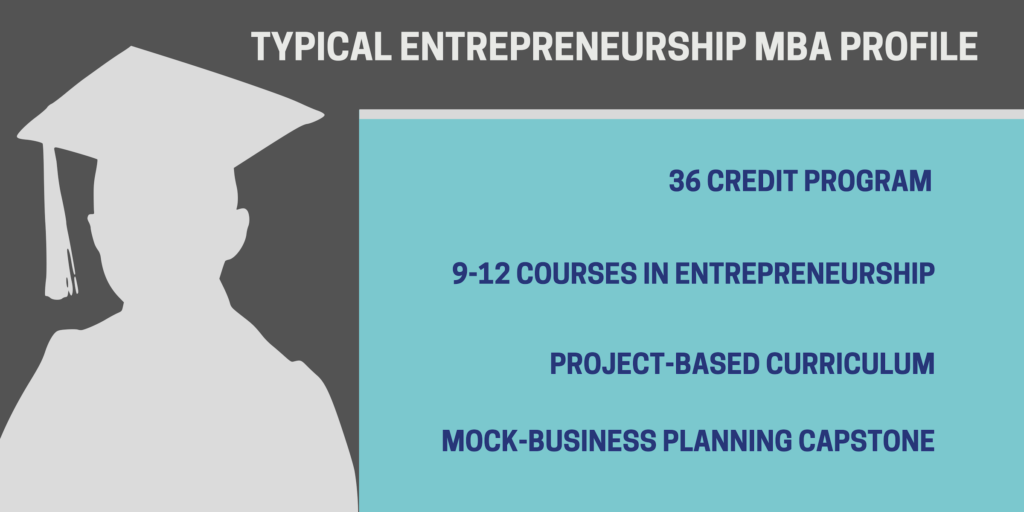
MBA in Entrepreneurship Pros and Cons
If you’re considering earning an MBA in entrepreneurship, you are likely weighing the pros and cons. What are the benefits, and the costs, of earning this degree, and how will it impact your future?
Some of the reasons we’ve identified for earning an entrepreneurship MBA are:
- Solid entrepreneurial skills like business planning and management
- Developing a global mindset
- Networking with peers, professors, and professionals
- Increasing professional credibility in raising venture capital
- Degree can provide a fallback career in business
An MBA in entrepreneurship is not without associated risks and costs, however, just as starting a business is not without risk. Some of the cons associated with this degree are:
- High annual tuition
- Time commitment
- Opportunity cost for time away from professional work
- Employers may be less likely to cover tuition for entrepreneurship degree
- Starting a business poses considerable risk of failure
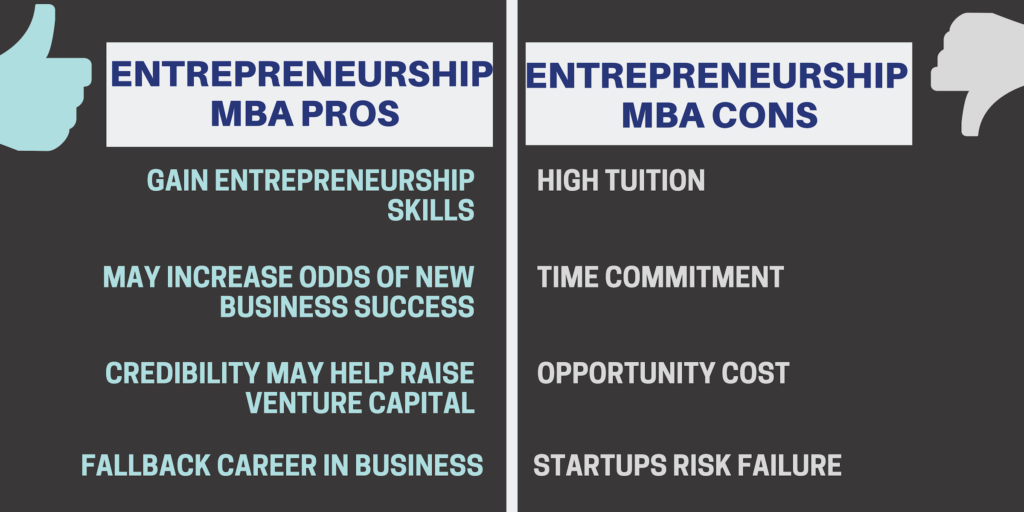
Should I get an MBA in Entrepreneurship?
Ultimately, the question of whether to pursue an MBA in entrepreneurship is a highly personal decision. If you’re committed to starting your own business, the most important questions to ask yourself are:
- Do I have the skills I need to start and run a business? If not, can I learn them outside of school or is a degree program the best way to acquire them?
- Do I have the time and money needed to enroll in and complete an MBA program? Would that time and money be better invested in starting my business?
- What are my plans if my startup ultimately closes? Would applying an MBA to a career in business be a good fit?